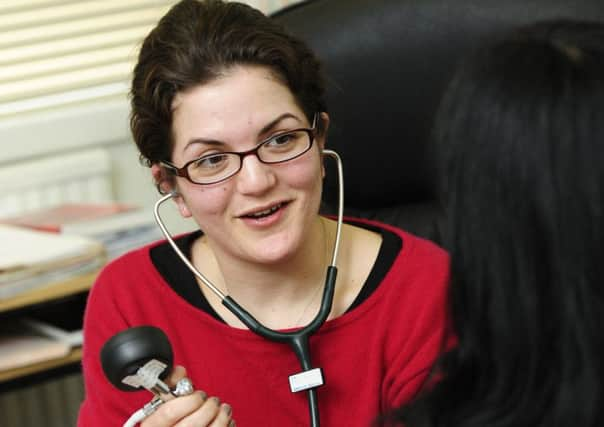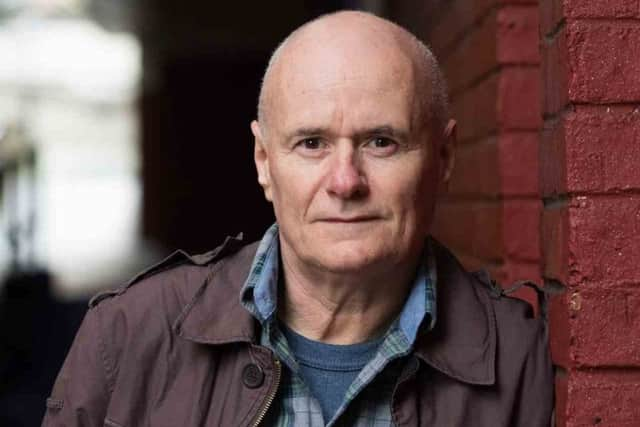Helen Martin: Who decides if you get to see a doctor?


GPs, renamed as Expert Medical Generalists, will be their “clinical leaders” and will personally see only patients with the most complex problems.
With several doctors in my family, I’ve known for years that both GPs and doctors in accident and emergency can be faced with time-wasting patients who have stood on a drawing pin, bruised their arm or contracted a moderate cold.
Advertisement
Hide AdAdvertisement
Hide AdSchool lessons in basic personal health and domestic first aid would be a good idea, and people are already making more use of pharmacists, often because they have to wait so long for a doctor’s appointment.


But how and by whom will the cut-off between other health professionals and doctors be defined? And is this going to be the thin end of the wedge?
GPs are trained to diagnose, prescribe and treat, and to know when specialist referral is required. Pharmacists are trained in medications and their effects, nurses are primarily trained to carry out treatments, and paramedics are trained to stabilise patients and keep them alive until they get to hospital.
Now don’t roar at me. I realise these are very simplistic summations and all health professionals are now trained to do a lot more than what most of us see as their core function. But a doctor is a doctor, a nurse is a nurse and a pharmacist is a pharmacist. They are not interchangeable.
Advertisement
Hide AdAdvertisement
Hide AdDoctors have the training to ask further questions, to link a variety of apparently minor systems which added together equate to something more serious. They are trained to observe symptoms the patient may not even realise they have. Their specific qualifications are required on all sorts of documentation from insurance to death certificates.


Of course, not everyone who turns up at a surgery with a headache, a common virus, a dubious mole or a minor wound, requires a doctor. The nurses at my GP practice are already handling more and more patients, and know which have to be passed up the line to the GP. They do a great job.
And the British Medical Association has signed up to the Scottish Government’s plan so they must at least approve of the principle. But as with everything, the devil is in the detail. The public have the right to clarity.
As clinical leaders, will GPs be the ones who decide how their practice and team works? So will it vary from surgery to surgery or be a dictated policy from health boards or government?
Advertisement
Hide AdAdvertisement
Hide AdPatients cannot be given an encyclopaedic directory of ailments to know which member of the team they should see or whether or not their symptoms entitle them to see a doctor. So who will decide? The receptionist?
At the moment GPs are independent prescribers of medicine. Some nurses and other professionals can also prescribe independently within their “competence” range. But will licences to prescribe have to be broadened?
It may all work perfectly well. But the public have the right to answers, explanations, and assurance that this is an effective and safe way of making the most of our limited resources and not a diluted, second-rate NHS delivered by those of lesser qualification.
Our benefits assessment shame
THE Ken Loach movie, I, Daniel Blake, about the country’s warped assessment process for work capability and benefits – which ignores genuine medical evidence – has elicited a range of responses from Conservative Toby Young’s dismissal of it as leftie propaganda, to that of my columnist colleague Fiona Duff who said it (understandably) made her feel thankful for what she had and happier with her lot.
Advertisement
Hide AdAdvertisement
Hide AdIt doesn’t matter whether you are rich or poor, of any political party, or perceive yourself as English, Scottish, Welsh, Irish or British.
If you are human, you will feel ashamed of your country and government, and of yourself for allowing this to go on and turning a blind eye to those – including doctors – who have protested against it.
This out-sourced process is, quite simply, responsible for starving and killing people. The only things I felt on leaving the cinema were anger, disgust, shame and the urgent need for a sick bag.
The robots are coming
MACHINERY and technology will remove one in six jobs by 2030. The main motivation for that, as it has been in the past, is to reduce the cost of business overheads, but in itself that is no justification . . . otherwise we’d still have slavery.
Advertisement
Hide AdAdvertisement
Hide AdYears ago when robots were but a dream, we all thought they would lead to more leisure time and shared jobs in an equal society. Now we know that only the rich will prosper.
We seem to blithely and blindly accept that all technology is good, advancement is inevitable and it cannot be subject to limits. The elephant in the room is how can mankind survive this long term?
No, I don’t have an answer. But I’d like governments across the world to start asking the question.
I’ve got the blue cheese blues..
A laboratory that sets safety standards for milk products across Europe has now cleared all five Errington cheeses and dismissed the toxic findings of Food Standards Scotland which forced the company to cease production, as based on faulty science.
What’s more dangerous... Dunsyre Blue or the FSS?